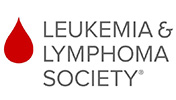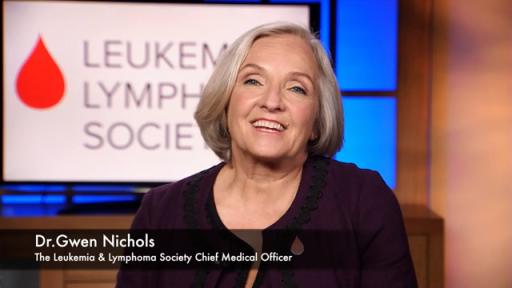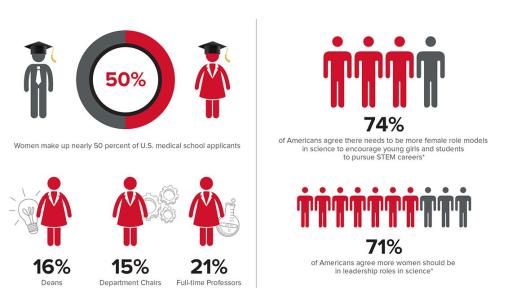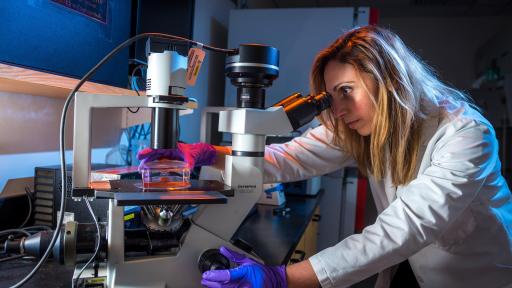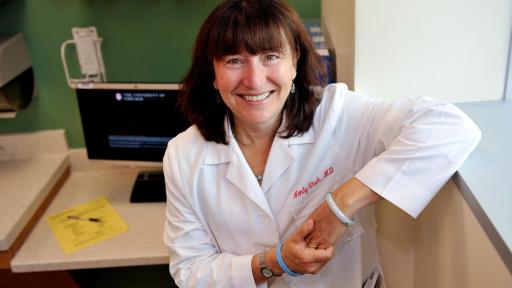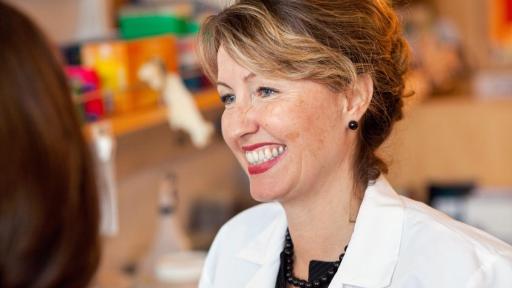The Time is Now for More Women in Science
According to a new survey by The Leukemia & Lymphoma Society, most Americans agree women are critical to scientific discovery
Rye Brook, N.Y. (March 13, 2018) – As breakthroughs in cancer treatments are occurring at an ever increasing rate, The Leukemia & Lymphoma Society (LLS) is shining a spotlight on the women in science who are helping to lead these advances.
Through its significant investment in cancer research – more than $1.2 billion since its founding nearly 70 years ago – LLS is committed to funding and recognizing female scientists, physicians, social workers and nurses, and encouraging young women to participate in STEM (science, technology, engineering and math) education and pursue careers in the sciences.
As part of its efforts to encourage more females to join the ranks of cancer researchers and physicians, LLS, the world’s leading nonprofit dedicated to fighting blood cancers, commissioned a survey of 1,000 Americans to learn their views of women’s role in cancer research.
Survey responses point to a desire to elevate women in the sciences. For example, eight in 10 adults polled believe women are critical to science discoveries, and seven in 10 adults, and eight in 10 women, believe more women should have leadership roles in science. As well, nearly 70 percent of American men and women surveyed, and 80 percent of women polled, believe the time is now for women to break the glass ceiling in science.
Leading by Example
According to LLS’s own glass ceiling breaker, Chief Medical Officer Gwen Nichols, M.D.: “I am keenly aware of the opportunities and obstacles that exist, and look for every opportunity to encourage women in this field. There are so many outstanding women who support LLS in our goal to cure blood cancers, including leukemia, lymphoma and myeloma. We are honored to shine a spotlight on just a few who represent the amazing work being done.”
Nichols’ career has spanned high-level positions in academic research and teaching, pharmaceutical development and the nonprofit cancer space. As former director of the Hematologic Malignancies Program at Columbia University, and past head of the Roche Translational Clinical Research Center, she is determined to lead the charge for more women scientists to play a larger role in conducting groundbreaking research in blood cancers supported by LLS, including transformational immunotherapies and precision medicine.
Women Making their Mark in Science
LLS’s Nichols recognizes that many women who have pursued careers to advance cancer research point to the importance of LLS funding, including a range of research grant programs that foster early careers, and help scientists accelerate their discoveries from the lab to clinical trials. LLS celebrates some of the women scientists who are assuming pivotal roles in advances that are dramatically improving outcomes for patients with blood cancers as well as other cancers and chronic diseases:
- Selina Chen-Kiang, Ph.D., a renowned professor of pathology and laboratory medicine, and immunology at Weill Cornell Medicine, has received multiple LLS grants over the past 17 years, enabling her seminal work on a therapy that targets enzymes that play vital roles in cell division and are implicated in multiple cancers. While her work is focused on myeloma and lymphoma, her discoveries helped lead the way to the therapy being FDA approved in 2015 for certain types of breast cancer. Chen-Kiang says she tells young women: “Follow your passion and be fearless.”
- Wendy Stock, M.D., University of Chicago Medicine, is a clinician scientist who designs and conducts clinical trials for patients with acute leukemias, translating individual patient characteristics, including the unique leukemia biology, into ways to optimize their treatments. Stock says that the biggest challenge for women scientists is the work/life balance. “Trying to create and sustain a rich personal and family life while building one’s career is a struggle that I believe we all face.”
- Catriona Jamieson, M.D., Ph.D., of University of California San Diego, is focused on eradication of cancer stem cells, which fuel relapse after treatment. Jamieson’s advice to young women pursuing STEM careers: “Surround yourself with people who support you, be strategic with your time and work effectively.”
- Tamara Ouspenskaia, Ph.D., Broad Institute of MIT, is pursuing approaches to cancer therapy harnessing the body’s immune system. She says that her mentor in graduate school was a passionate advocate for women in science, and the head of her post-doctoral lab leads by example, managing the diverse group of researchers while making time for her family. But she also encountered colleagues whose attitudes were disappointing. Her advice: “Grow thick skin and do not let disparaging comments discourage you.”
- Katherine Borden, Ph.D., University of Montreal, studies the biological pathways that drive leukemia. She tells young students interested in pursuing science: “You can be the first person in the entire world to discover some new molecular pathway and that discovery might change how patients are treated.”
- Rayne Rouce, M.D., Baylor College of Medicine and Texas Children’s Cancer Center, part of a team advancing immunotherapy approaches for leukemia and lymphoma patients, says, “I truly believe that I love mentoring others because I realize that I would not have achieved what I have if it wasn't for my mentors.”
More Highlights of the LLS-commissioned Survey:
- Despite the fact that women make up 50% of medical school applicants, data show that women are not attaining the highest levels of leadership positions at the same pace as men (Association of American Medical Colleges). According to the LLS survey, Americans believe that women are critical to science because they bring a unique perspective to scientific inquiry that can lead to breakthrough discoveries, and more women in STEM can inspire a new generation to break the glass ceiling.
- Respondents, particularly women, recognize the obstacles; for example, eight in 10 American women polled say more needs to be done to encourage women to pursue STEM careers.
- Four in 10 women say that they did not have enough opportunities to pursue science in school.
- Nearly eight in 10 adults agree that successful women in science are one of the most influential factors in encouraging young girls to become interested in science.
LLS Fosters Women Addressing Barriers to Cancer Care
New and better therapies can’t help patients who can’t access them. In addition to funding groundbreaking research, LLS provides free information and support for patients, caregivers and healthcare professionals. Elisa Weiss, Ph.D., LLS senior vice president, patient access and outcomes, leads an all-women team of master’s trained health professionals with expertise in the blood cancers who help patients understand their diagnosis, find treatment options, find clinical trials and navigate the financial burdens of healthcare. Weiss, a medical sociologist by training, works with other leading experts, some funded by LLS, to design and conduct health research to understand the impact of the cost of care on cancer patients, including the cost effectiveness of treatment and quality of life issues.
From the School Hallways to the Halls of Congress
LLS’s efforts to promote women in science begin in the classroom. LLS’s Student Series fundraising campaign reaches more than 14.5 million students in approximately 27,000 schools across the country with its set of science-based philanthropy programs. The campaign has developed a new STEM curriculum to inspire the next generation of scientists, both girls and boys. The proprietary curriculum gives K-5 students an in-depth look at LLS-funded science, covers key Common Core skills and allows students to learn how the money they raise makes an impact.
Rounding out its efforts is LLS’s small but mighty Office of Public Policy, based in Washington, D.C., led by Bernadette O’Donoghue, vice president of public policy. She and her team focus on accelerating cures and ensuring access to treatment by working with national and state legislators to advocate for laws and policies that remove barriers to therapies and care.
LLS’s Female Researchers are Moving Mountains!
Irene Ghobrial, M.D., of Dana-Farber Cancer Institute, has received numerous LLS grants during her career to support her research to find ways to prevent early stage blood disorders from progressing to more serious cancers such as myeloma and leukemia. Ghobrial also gives back by fundraising through LLS’s Team In Training and Light The Night campaigns, and has run two half marathons and even climbed Mount Kilimanjaro to support LLS’s mission.
“I always do whatever I can for The Leukemia & Lymphoma Society,” says Ghobrial. “I can’t say enough good things about LLS’s research, patient care and fundraising campaigns. Whenever there is an LLS event in Boston I always try to volunteer.” And her advice to young women: “Never think you cannot do it because you are a woman. Don’t hold yourself back. You can achieve anything you want to do. Dream Big!”
About The Leukemia & Lymphoma Society
The Leukemia & Lymphoma Society® (LLS) is the world's largest voluntary health agency dedicated to fighting blood cancer. The LLS mission: Cure leukemia, lymphoma, Hodgkin's disease and myeloma, and improve the quality of life of patients and their families. LLS funds lifesaving blood cancer research around the world, provides free information and support services, and is the voice for all blood cancer patients seeking access to quality, affordable, coordinated care.
Founded in 1949 and headquartered in Rye Brook, NY, LLS has chapters throughout the United States and Canada. To learn more, visit www.LLS.org. Patients should contact the Information Resource Center at (800) 955-4572, Monday through Friday, 9 a.m. to 9 p.m. ET.
For additional information visit lls.org/lls-newsnetwork. Follow us on Facebook, Twitter, and Instagram.
Media contacts:
Linda Heaney
[email protected]
914-821-8208
Andrea Greif
[email protected]
914-821-8958
The time is now for #WomeninScience. @LLSusa wants to hear the stories of women trailblazers who inspire you to #FightBloodCancer Tweet
Resources
Download InfographicConnect
The Leukemia & Lymphoma SocietyTweets by LLSusa
